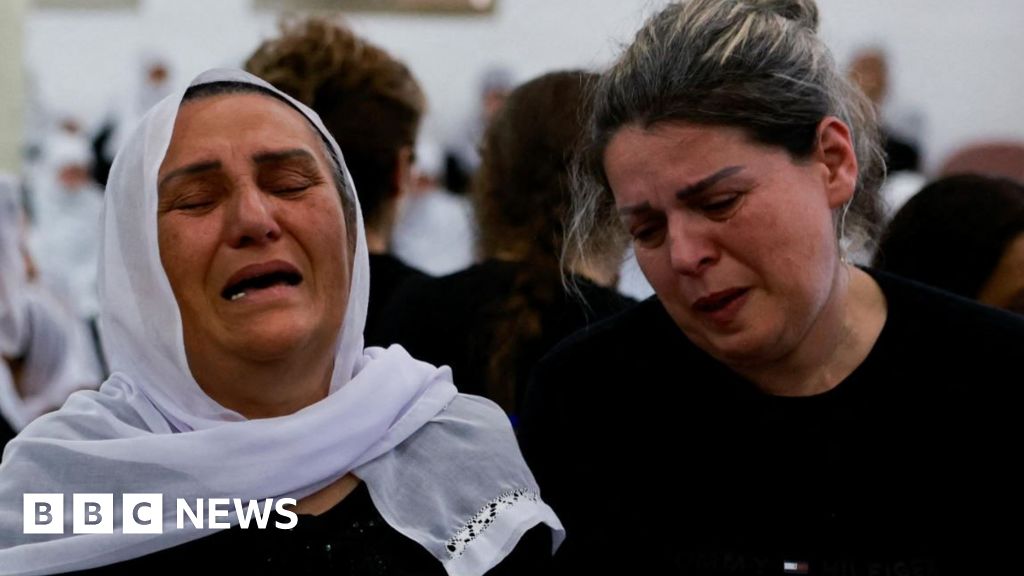Israel’s security cabinet has given Prime Minister Benjamin Netanyahu and his defense minister the authority to decide when and how to retaliate against deadly rocket attacks that Israel and the United States say were carried out by the Lebanese Shiite militant group Hezbollah.
Ministers held an emergency meeting after an attack in the Israeli-occupied Golan Heights on Saturday night killed 12 children and teenagers from the Druze community. Hezbollah denies responsibility.
It was the deadliest cross-border incident in months of fighting between the two sides.
The attack heightened fears that hostilities, which have so far been relatively restrained, could escalate into all-out war.
Western governments have urged Israel to show restraint in its response.
The White House said it has been in ongoing discussions with its Israeli and Lebanese counterparts since the horrific attack on a sports ground in the Druze town of Majdal Shams.
It said it was “still working towards a diplomatic solution along the Blue Line” [the unofficial frontier between Israel and Lebanon] This will end all attacks once and for all”.
Lebanese state media said an Israeli drone strike killed two people on Monday morning outside the Lebanese town of Shaqra, about 6.5 kilometers (four miles) from the Israeli border. Israel has yet to comment on the report.
The funeral of the young victim was held in an atmosphere of grief in Majdal Shams on Sunday. Thousands of people gathered as the coffin, draped in white, was carried through the town.
The attack was the most devastating for the Druze community, which has lived in the Golan Heights for centuries. They are part of Arabic-speaking ethnic and religious groups in Lebanon, Syria, the Golan Heights and northern Israel.
Residents of the Israeli-occupied Golan Heights have been under Israeli rule since Israel seized the area from Syria in the 1967 war, although many retain allegiance to Syria. About 21,000 people live on this rocky plateau, about 20% of whom have accepted Israeli citizenship.
The attack on Majdal Shams sparked outrage across Israel and among the Druze community, some 110,000 of whom also live in Israel.
After the attack, Netanyahu cut short his visit to the United States and returned to Israel. He held meetings with defense officials ahead of a security cabinet meeting on Sunday.
At the end of the hours-long meeting, the prime minister’s office issued a brief statement saying only that “cabinet members have authorized the prime minister and the defense minister to determine the manner and timing of responses to the Hezbollah terrorist organization.”
Netanyahu earlier said in a call to express his condolences to Sheikh Mufaq Tarif, the spiritual leader of Israel’s Druze community, that Hezbollah would “pay a heavy price for this that has not been paid so far.”
Hezbollah has strongly denied being behind the attack, which reports have blamed on a failed Israeli interceptor missile.
Israel’s chief of military staff, Lt. Gen. Herzi Halevi, said in a statement on Sunday that the Israel Defense Forces (IDF) “know exactly where the rocket was launched.”
General Halevi confirmed that it was an unguided surface-to-surface Falaq rocket with a 53-kilogram warhead. “This is a Hezbollah rocket. Whoever fires this rocket into a built-up area wants to kill civilians, children,” he said.
Hezbollah fired rockets at Israeli positions a day after Hamas launched a deadly attack on Israel on October 7, escalating previously sporadic fighting between Israel and Hezbollah. Hezbollah says it is taking action to support the Palestinians.
Israel’s security cabinet has given Prime Minister Benjamin Netanyahu and his defense minister the authority to decide when and how to retaliate against deadly rocket attacks that Israel and the United States say were carried out by the Lebanese Shiite militant group Hezbollah.
Ministers held an emergency meeting after an airstrike in the Israeli-occupied Golan Heights killed 12 children and teenagers in the Druze community on Saturday night. Hezbollah denies responsibility.
It was the deadliest cross-border incident in months of fighting between the two sides.
The attack heightened fears that hostilities so far relatively limited could escalate into all-out war.

